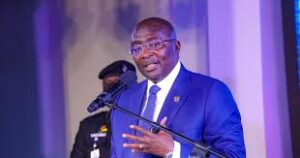Vanderpuye Mocks Minority MPs’ March: ‘They’re Just Trying to Burn Belly Fat

Nii Lantey Vanderpuye, the National Coordinator of the District Road Improvement Programme (DRIP), has dismissed the recent protest by Minority Members of Parliament as theatrics designed more for public attention than for constitutional redress. The MPs, who marched to the Ghana Police Headquarters to express their frustration over the delay in declaring the Ablekuma North parliamentary election results, were accused by Vanderpuye of directing their grievances at the wrong institution.
Speaking on Breakfast Daily, a morning show on Channel One TV on Thursday, June 5, Vanderpuye questioned both the logic and effectiveness of the protest. He asserted that the Electoral Commission (EC), not the Ghana Police Service, is the constitutionally mandated body responsible for the conduct and announcement of election results. According to him, the MPs’ actions reflect either a poor understanding of institutional roles or a deliberate attempt to attract public sympathy through sensationalism.
“The whole exercise seemed pointless. If the aim was to address election concerns, then the proper place to go would have been the Electoral Commission,” he said. “Going to the Police Headquarters looks more like a show than a solution.”
Mocking the protest, Vanderpuye joked that the MPs may have simply wanted to get some exercise, suggesting their motivation was less about justice and more about personal optics. “Some of them just want to burn belly fat,” he quipped. “Because if they were truly serious, they would know the IGP doesn’t declare election results.”
Vanderpuye criticized the decision to petition the Inspector General of Police (IGP), stating unequivocally that the Ghana Police Service has no constitutional authority over election result declarations. He stressed that legal or electoral grievances must be channeled through the appropriate institutions — either by petitioning the EC directly or taking the matter to court.
“If the Minority believes there’s been an injustice, they should use the legal avenues available,” he advised. “Filing a petition with the Electoral Commission or going to court would have demonstrated a commitment to due process. Instead, they chose to march to the police station, which is clearly a misplaced effort.”
He went on to emphasize the dangers of such misdirected protests, warning that political actors must not mislead the public or undermine trust in the country’s democratic institutions for the sake of media attention.
“Political leadership demands responsibility. These actions may be interpreted by citizens as a sign that our institutions don’t matter. That’s dangerous for our democracy,” Vanderpuye cautioned.
The controversy stems from delays in the official release of election results in the Ablekuma North constituency following the December 2024 general elections. The Minority MPs, citing a lack of transparency, took to the streets in protest. However, their chosen target — the Police Headquarters — has raised questions about their understanding of Ghana’s electoral framework.
Vanderpuye further noted that Ghana’s democracy has matured to a point where institutions should be respected and used appropriately. He argued that undermining institutional processes only breeds chaos and confusion.
“What message are we sending to young people when elected officials ignore procedures and instead choose drama over substance?” he asked. “We must strengthen, not erode, the rule of law.”
Public reactions to Vanderpuye’s remarks have been mixed. While some have backed his critique, agreeing that the MPs should have taken their petition to the right body, others have accused him of trivializing a legitimate concern.
Nevertheless, the core issue — the delay in declaring the Ablekuma North results — remains unresolved. Stakeholders continue to call for transparency and accountability, urging the Electoral Commission to clarify the situation promptly.
As the political climate intensifies, observers are reminding all political actors to prioritize institutional integrity and democratic norms in addressing electoral disputes.






